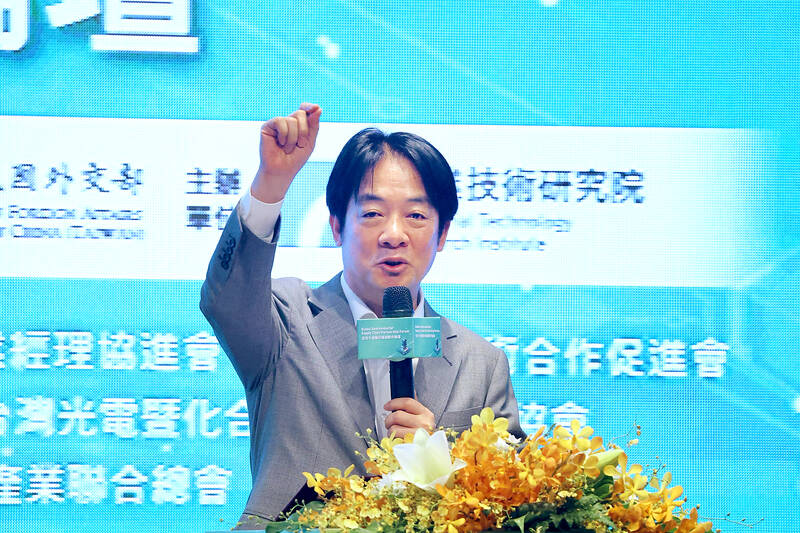President William Lai (賴清德) yesterday called for unity and cooperation in the global semiconductor supply chain to take on dumping by Chinese suppliers.
Speaking at a semiconductor forum organized by the Industrial Technology Research Institute (ITRI, 工研院), Lai said the semiconductor sector continues to face problems caused by unfairly low prices from Chinese suppliers of materials needed in mature processes.
The Chinese government has used subsidies, among other measures, to allow suppliers to dump products on the global market, he said.

Photo: CNA
The global semiconductor industry now faces a similar problem, and if it fails to take action, the situation would worsen, he added.
“Countries should unite and cooperate as partners in the global semiconductor supply chain to ease the impact of dumping from China,” Lai said. “Otherwise, innovation cannot continue and industrial development would be affected.”
Taiwan ranks No. 1 in the global pure play foundry sector, accounting for 90 percent of total advanced chip sales, first in the integrated circuit (IC) packaging and testing services business, and third in the IC design business, he said.
The nation also continues to be part of the global supply chain, Lai said.
Other countries contribute to the global semiconductor industry in their own ways, such as the US, which is good at semiconductor materials, equipment and technology development, so Taiwan cannot be the only driver of the sector’s growth, he added.
“Cooperation in the global supply chain is very important in the push for the prosperity of the next generation,” Lai said. “Taiwan has the responsibility to act as a focal point in technology development in the artificial intelligence [AI] era.”
The government would work with the industrial sector in creating policies to improve legal mechanisms, and provide financial assistance and tax incentives to help the industry grow, he said.
Echoing Lai, ITRI senior vice president Stephen Su (蘇孟宗) said that the global semiconductor sector needs a larger talent pool, so Taiwan should cooperate with partners in cultivating the next generation of talent.
Taiwan should also work with partners to build a diversified semiconductor supply chain by creating forward-looking technologies and setting industrial standards, he said.
Japanese Representative to Taiwan Kazuyuki Katayama said that cooperation between Taiwan, Japan, the US and Europe should prevent interruptions in the semiconductor supply chain, which would in turn guarantee the world’s economic security.
Meanwhile, American Institute in Taiwan Deputy Director Jeremy Cornforth said the US values its partnership with Taiwan, and that he hoped the two sides would take advantage of technological developments to build a resilient supply chain.
Cornforth said he also hoped to reinforce the Taiwan-US partnership, which would allow Washington to maintain its competitive edge in semiconductor and AI development.

Sweeping policy changes under US Secretary of Health and Human Services Robert F. Kennedy Jr are having a chilling effect on vaccine makers as anti-vaccine rhetoric has turned into concrete changes in inoculation schedules and recommendations, investors and executives said. The administration of US President Donald Trump has in the past year upended vaccine recommendations, with the country last month ending its longstanding guidance that all children receive inoculations against flu, hepatitis A and other diseases. The unprecedented changes have led to diminished vaccine usage, hurt the investment case for some biotechs, and created a drag that would likely dent revenues and

Macronix International Co (旺宏), the world’s biggest NOR flash memory supplier, yesterday said it would spend NT$22 billion (US$699.1 million) on capacity expansion this year to increase its production of mid-to-low-density memory chips as the world’s major memorychip suppliers are phasing out the market. The company said its planned capital expenditures are about 11 times higher than the NT$1.8 billion it spent on new facilities and equipment last year. A majority of this year’s outlay would be allocated to step up capacity of multi-level cell (MLC) NAND flash memory chips, which are used in embedded multimedia cards (eMMC), a managed

CULPRITS: Factors that affected the slip included falling global crude oil prices, wait-and-see consumer attitudes due to US tariffs and a different Lunar New Year holiday schedule Taiwan’s retail sales ended a nine-year growth streak last year, slipping 0.2 percent from a year earlier as uncertainty over US tariff policies affected demand for durable goods, data released on Friday by the Ministry of Economic Affairs showed. Last year’s retail sales totaled NT$4.84 trillion (US$153.27 billion), down about NT$9.5 billion, or 0.2 percent, from 2024. Despite the decline, the figure was still the second-highest annual sales total on record. Ministry statistics department deputy head Chen Yu-fang (陳玉芳) said sales of cars, motorcycles and related products, which accounted for 17.4 percent of total retail rales last year, fell NT$68.1 billion, or

In the wake of strong global demand for AI applications, Taiwan’s export-oriented economy accelerated with the composite index of economic indicators flashing the first “red” light in December for one year, indicating the economy is in booming mode, the National Development Council (NDC) said yesterday. Moreover, the index of leading indicators, which gauges the potential state of the economy over the next six months, also moved higher in December amid growing optimism over the outlook, the NDC said. In December, the index of economic indicators rose one point from a month earlier to 38, at the lower end of the “red” light.